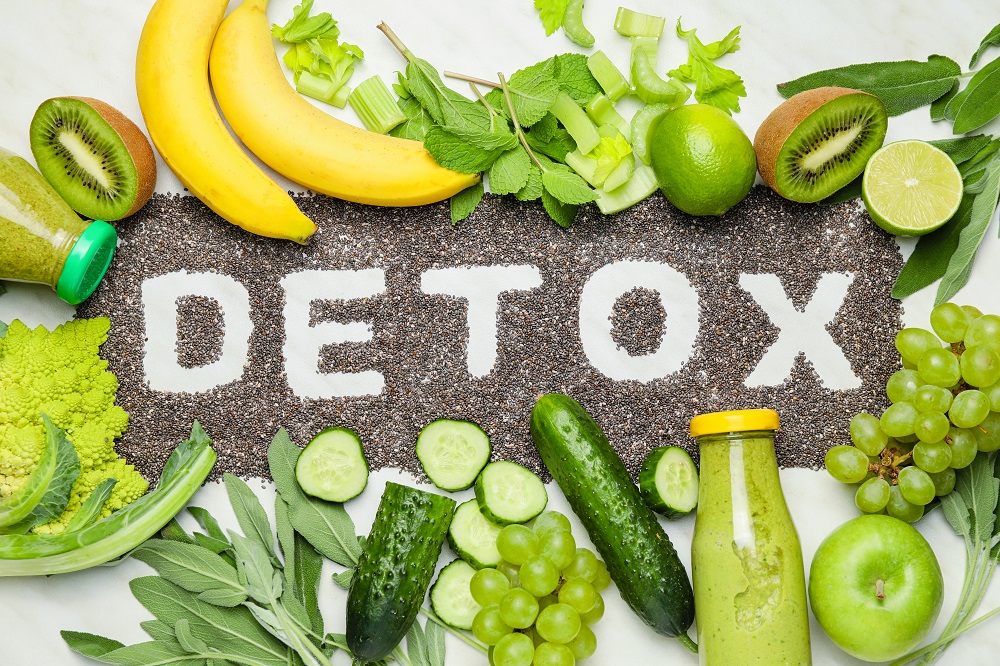Instead of continuing with the juice detox, do this.
There is usually an intense push to “detox” after the weeks of overindulgent eating and drinking during the holidays. This pressure can take the form of making tight diet plans and 30-day cleanses, or it can take the form of purchasing “detox” items like teas, juices, supplements, and meal subscriptions. The idea that we must take specific action—buying a certain product, eating a particular ingredient, or giving up a particular food—in order to rid our bodies of toxins is, in fact, a marketing gimmick.
We spoke with a certified dietitian to find out the truth about clearing your system and the reasons being your healthiest self doesn’t require following any fad diets or detox trends.
Your Body Is Made to Remove Toxins on Its Own
“The majority of healthy bodies are capable of removing toxins and dangerous substances without assistance,” explains registered dietitian Bianca Tamburello, RDN, of FRESH Communications. In actuality, the body’s organ systems’ main function is to break down and get rid of pollutants. Furthermore, these systems operate automatically without taking breaks as long as they are in good health.
According to Tamburello, “the lymphatic system, colon, liver, kidneys, lungs, and even skin play a role in regular body detoxification.” “Detox diets and supplements are not required because these organs and systems effectively neutralize and eliminate toxic chemicals. Actually, not much evidence exists to back up the claims made for detox diets.
‘Detox’ Is Just a Wise Marketing Phrase
However, there is proof that detoxification diets and products in particular are ineffective, as demonstrated by this 2015 review that was published in the Journal of Human Nutrition and Dietetics.
Detox diets have the potential to remove significant nutritional groups from your diet, but at best they may assist in removing inflammatory, processed foods and alcohol from your diet. Tamburello affirms, “One food or drink will not magically detox the body.”
When it comes to “detoxifying” dietary supplements, more caution is required. The reason for this is because dietary supplements are not subject to the same standards, regulations, or oversight by the US Food and Drug Administration (FDA) as food and beverage products. Before putting their items on the market, supplement manufacturers are not compelled to demonstrate the efficacy or safety of their offerings.
This implies that goods that are ineffective, lack the ingredients they say they do, or have the potential to be harmful can be readily marketed to customers. (In the event that a healthcare provider recommends a dietary supplement, this is where third-party verifiers like NSF and U.S. Pharmacopeia (USP) come in handy.) When the body is seriously ill, that’s the only time it might not be doing self-detoxification correctly.
Unhealthy toxin accumulation may be the outcome of diseases affecting vital detox organs like the liver and kidneys. But if your body is operating at a point where this becomes problematic, the best course of action is to follow your doctor’s management plan rather than a detox diet.

How to Aid the Body’s Organic Detoxification Process
Having said that, there are a number of healthful habits you may adopt to aid with your body’s natural biological detoxification process. According to Tamburello, “a balanced diet that consists primarily of whole foods and plants supports the body’s natural detox systems as well as overall health.”
Make Sure You Get Enough Water Each Day
According to Tamburello, “it’s critical to stay hydrated in order to flush out substances like carbon dioxide and urea.” Furthermore, dehydration impairs the body’s capacity to expel toxins through breathing, sweating, and urine. Simple strategies to improve your hydration include carrying a reusable water bottle with you at all times, choosing unsweetened, decaffeinated teas or sparkling waters, and experimentating with sugar-free flavorings like fresh fruit.
Adopt Good Sleep Habits
The body uses a restful night’s sleep to replenish its energy and resume all essential processes, including natural detoxification. Our bodies endure the weight of persistent sleep deprivation, and our organ systems may function less effectively. This may have detrimental effects on one’s health, such as less self-detoxification. It’s probably common knowledge that we should aim for seven to nine hours of high-quality sleep each night.
Eat More Foods High in Antioxidants
“Antioxidant-rich foods shield body cells from stressors, which in turn supports the body’s natural detoxification processes by maintaining the health of body organs,” says Tamburello. “Foods rich in antioxidants include broccoli, legumes, citrus fruits, berries, bell peppers, and green tea.” The good news is that you may increase your intake of antioxidants by attempting to eat more fruits, vegetables, whole grains, nuts, seeds, spices, and legumes. In fact, all plant-based meals will contain certain plant chemicals that are high in antioxidants.
Lower Your Consumption of Alcohol
Alcohol is one of the most commonly consumed poisons. Although the occasional happy hour drink is perfectly OK, drinking makes your liver work hard to process and excrete the ethanol that alcohol contains from your body. Frequent and excessive alcohol consumption puts extra strain on our livers, which can eventually cause damage to this important organ.
Emphasize Fermented Foods to Promote Gut Health
According to Tamburello, “a healthy gut and digestive tract support the body’s natural detox systems.” This is because our immune system and the gut bacteria work closely together to aid in the breakdown of toxins. Tamburello continues, “Foods that have undergone fermentation, such as kraut, yogurt, and kimchi, are rich in probiotics that support a varied and balanced gut microbiome. Miso paste, sauerkraut, kefir, and kombucha are some more delectable fermented foods.
Consume and Drink Less Highly Processed Foods
All across the body, inflammation is brought on by ultra-processed foods such as soda, chips, cookies, cheese curls, fast food, frozen dinners, candies, and cold meats. Our organ systems, especially the detoxification systems, have to work harder than they would normally due to this inflammation. Furthermore, consuming too many ultra-processed foods over an extended period of time has been connected to a host of chronic illnesses, including conditions that affect our main detoxification systems, such as kidney and liver disease.
Include More Foods High in Sulfur
According to Tamburello, “foods high in sulfur, such as broccoli, onions, and garlic, are particularly helpful in removing certain heavy metals and supporting antioxidant activity.” Additionally, meals high in sulfur boost the activity of glutathione, an antioxidant that plays a critical role in the body’s natural detoxification process.
The Conclusion on Detoxification:
“Detox diets are not necessary for healthy bodies, and in my capacity as a registered dietitian, I do not advocate them,” Tamburello states. “Instead, concentrate on increasing the amount of whole foods in your diet, such as fruits, vegetables, and whole grains, to support the body’s natural detoxification processes and to promote overall health.”




